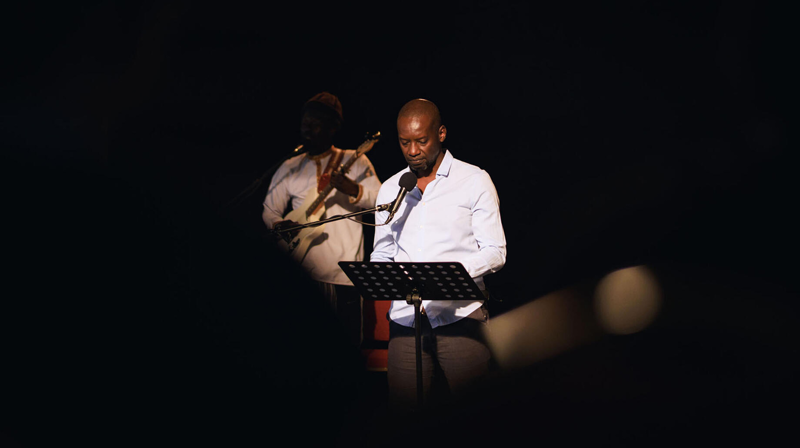Thirty years after the genocide perpetrated against the Tutsi, Dorcy Rugamba — actor, author, director and a major figure of the Rwandan cultural scene — brings to life an extract from his work Hewa Rwanda – Letter to the absent, a profoundly moving tale of his family, culture and spirituality. In tandem with Senegalese multi-instrumentalist and singer Majnun, Rugamba presents a musical reading from his memoir, an ode to immeasurable loss and love. “How can one grasp the full dimension of an event that wiped out more than a million people?” he asks. He remains as close as possible to those who are absent, honours their memory and lives, and explores the world of before in search of its beauty and poetry. Rugamba creates a moving account, transporting the audience with his writing and a voice of rare intensity.
"While 'Hewa Rwanda, Letter to the Absent,' addresses the genocide, questions of mourning, and a family that was nearly annihilated, I primarily wanted it not to be a commemorative text but a hymn to life, so the tone of the text deliberately embraces lightness, humour, poetry, music, and life in all its aspects.
"Over time, I realized, long after the genocide, that the victims, after losing their lives, faced another form of annihilation—the risk of their existence disappearing as well, after their bodies. Young Rwandans born afterward, as well as international audiences, no longer know who these people were. We often only know their number; sometimes their names are engraved on a stone. Their existence tends to vanish behind their status as victims. A person’s existence is much richer than his biological life. There are many things that survive death under normal circumstances: a person’s culture, their projects, their loves, their ambitions, their legacy, their ideals, their achievements, the struggles and challenges they faced during their existence and to which the world afterward is indebted. All of this, in the memory of the living, tends to fade before the enormity of the genocide.
"This 'love letter to the absent' is therefore a hymn to life, an attempt to symbolically resurrect the absent so that their lives and existence can be restored to them, and they can cease to be merely the unfortunate victims of a genocide."
Dorcy Rugamba
Credits:
Author — Dorcy Rugamba
Performers — Dorcy Rugamba and Majnun
Musical Creation — Majnun and Akasha
Stage Manager — Jules Niyonkuru
Dialogue Director — Judy Dennis
Tour Manager/Charge du Rhinoceros — Marie-Laure Wawriczny
RAI Production Rwanda Arts Initiative (Rwanda)
Producer Ellen Dennis (USA)
Tour manager The Charge of the Rhinoceros (Belgium)
Book published by JC Lattès (France)
